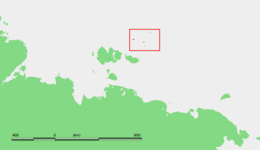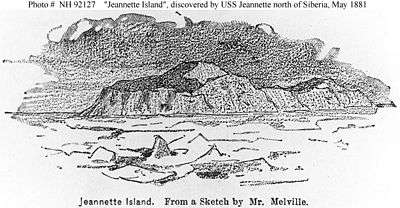Jeannette Island
| Native name: <span class="nickname" ">Остров Жанне́тты | |
|---|---|
|
Jeannette is the easternmost island of the De Long group. | |
 Map showing the location of the De Long Islands. | |
| Geography | |
| Location | East Siberian Sea |
| Coordinates | 76°42′56″N 158°06′33″E / 76.71556°N 158.10917°ECoordinates: 76°42′56″N 158°06′33″E / 76.71556°N 158.10917°E |
| Archipelago | De Long Islands |
| Total islands | 5 |
| Area | 3.3 km2 (1.3 sq mi) |
| Length | 3 km (1.9 mi) |
| Width | 1.3 km (0.81 mi) |
| Highest elevation | 351 m (1,152 ft) |
| Highest point | Ice cap HP |
| Administration | |
|
Russia | |
| Federal subject | Far Eastern Federal District |
| Republic | Sakha |
| Demographics | |
| Population | uninhabited |
Jeannette Island (Russian: Остров Жанне́тты, Ostrov Zhannetty) is the easternmost island of the De Long Islands archipelago in the East Siberian Sea. Administratively it belongs to the Sakha Republic of the Russian Federation.
Geography
Jeannette is the second smallest island of the De Long group, being only 2 km (1.2 mi) in length. It has an area of approximately 3.3 km2 (1.3 sq mi). The island surface is mainly covered by a central ice cap and firn. The highest peak of the island is in the middle of the ice cap, reaching a height of 351 m (1,152 ft).
Geology
Jeannette Island consists of folded Paleozoic graywackes overlain by Cenozoic conglomerates. The graywacke is coarse-grained and contains local lenses of conglomerate. An unconformity separates the Cenozoic conglomerate from the underlying graywacke. The Cenozoic conglomerate contains well-rounded pebbles, cobbles, and boulders of quartz sandstone, quartzite, diorite, andesite-basalts, and altered granite.[1][2]
History
It was discovered in 1881 by the Jeannette expedition, commanded by Lieutenant Commander George W. DeLong, USN. United States explorer and US Navy Lieutenant Commander George W. DeLong set out in 1879 aboard the Jeannette, hoping to reach Wrangel Island and to discover open seas in the Arctic Ocean near the North Pole. However, the ship entered an ice pack near Herald Island in September 1879 and became trapped. The vessel drifted several hundred miles with the ice, passing north of Wrangel Island. In May 1881 it approached Jeannette Island and Henrietta Island. According to The Annual Report of the Secretary of the Navy, for the Year 1882 (pg.16), "A sled party landed, hoisted the national ensign, and took possession in the name of the United States.[3][4] The excursion, led by George W. Melville, landed on June 2 or 3, constructed a cairn, and placed inside it a record of their visit.

During the 1914-15 Imperial Russian Arctic Ocean Hydrographic Expedition led by Boris Vilkitsky, the Vaygach approached Jeannette Island with the intention of mapping Jeannette and Henrietta Islands, but heavy ice blocked the approach. In 1916 the Russian ambassador in London issued an official notice to the effect that the Imperial government considered Henrietta, along with other Arctic islands, integral parts of the Russian Empire. This territorial claim was later maintained by the Soviet Union.[5]
Some U.S. individuals assert American ownership of Jeannette Island, and others of the De Long group, based on the 1881 discovery. However, the United States government has not pursued De Long's claim to Jeannette Island, and recognizes it as Russian territory.[6]
References
- ↑ Kos’ko, M.K., B.G. Lopatin, and V.G. Ganelin, 1990, Major geological features of the islands of the East Siberian and Chukchi Seas and the Northern Coast of Chukotka. Marine Geology. vol. 93, pp. 349–367.
- ↑ Fujita, K., and D.B. Cook, 1990, The Arctic continental margin of eastern Siberia, in A. Grantz, L. Johnson, and J. F. Sweeney, eds., pp. 289-304, The Arctic Ocean Region. Geology of North America, vol L, Geological Society of America, Boulder, Colorado.
- ↑ De Long, Emma, ed., 1883, The Voyage Of The Jeannette: The Ship And Ice Journals Of George W. De Long, Volume II Houghton Mifflin And Company. Last visited May 26, 2008 at the Internet Archive
- ↑ Headland, R.K., 1994, OSTROVA DE-LONGA ('De Long Islands'). Scott Polar Research Institute, Cambridge University. Lasted visited May 26, 2008.
- ↑ Bureau of European and Eurasian Affairs, US State Department, 2003, Status of Wrangel and other Arctic islands Last visited March 15, 2014.
External links
- Anisimov, M.A., and V.E. Tumskoy, 2002, Environmental History of the Novosibirskie Islands for the last 12 ka. 32nd International Arctic Workshop, Program and Abstracts 2002. Institute of Arctic and Alpine Research, University of Colorado at Boulder, pp 23–25.
- Headland, R. K.,1994, OSTROVA DE-LONGA ('De Long Islands'), Scott Polar Research Institute, University of Cambridge, Cambridge, United Kingdom.
- Naval Historical Center, 2003, Jeannette Arctic Expedition, 1879-1881 — Overview and Selected Images. Last visited May 26, 2008.
- Schirrmeister, L., H.-W. Hubberten, V. Rachold, and V.G. Grosse, 2005, Lost world - Late Quaternary environment of periglacial Arctic shelves and coastal lowlands in NE-Siberia. 2nd International Alfred Wegener Symposium Bremerhaven, October, 30 - November 2, 2005.